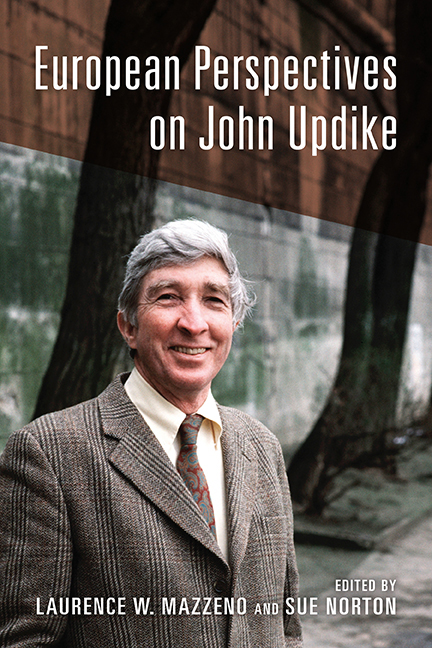Book contents
- Frontmatter
- Contents
- Acknowledgments
- List of Abbreviations
- Introduction: Updike as Europeans See Him
- Part I Coming of Age, Aging in Time
- Part II Love, American Style
- Part III Amazing Grace, American Faith
- Part IV Old World Myths, New World News
- 10 “Hey, Come On, We're All Americans Here”: The Representation of Muslim-American Identity in John Updike's Terrorist
- 11 Intertextual Updike: Gertrude and Claudius
- 12 Rabbit and the News
- Sources for Further Study
- Notes on the Contributors
- Index
12 - Rabbit and the News
from Part IV - Old World Myths, New World News
Published online by Cambridge University Press: 15 August 2018
- Frontmatter
- Contents
- Acknowledgments
- List of Abbreviations
- Introduction: Updike as Europeans See Him
- Part I Coming of Age, Aging in Time
- Part II Love, American Style
- Part III Amazing Grace, American Faith
- Part IV Old World Myths, New World News
- 10 “Hey, Come On, We're All Americans Here”: The Representation of Muslim-American Identity in John Updike's Terrorist
- 11 Intertextual Updike: Gertrude and Claudius
- 12 Rabbit and the News
- Sources for Further Study
- Notes on the Contributors
- Index
Summary
FOR THREE SUMMERS at the beginning of the 1950s, after graduating from high school and on summer vacation from Harvard, John Updike worked as a “copyboy and gofer” on his local paper, the Reading Eagle (Begley 2014, 29; De Bellis 2013, 61). His job involved taking copy “over the phone,” “running copy between newsroom, composing room and courthouse; serving editors coffee and breakfast; and sometimes … the mind-numbing tasks of compiling theater and radio timetables” (Posten 2009). Thirty years later, he recalled the job fondly, telling an interviewer (at the Eagle) that working on a paper was “a better route to writing than becoming a college instructor, as so many are doing” (Zissa [1977] 2016, 35).
Updike began his literary career at the dawn of what Mark McGurl (2009) has termed the “program era,” the post–Second World War flourishing of creative writing as a college subject. The establishment of MFA programs may have been the “most significant event in post-war American literature” (ix), but it was one that bypassed Updike. Updike seemed to represent a “dying,” now almost extinct, “breed” in American fiction (Batchelor 2013, 8), as did a number of other writers, such as Philip Roth and Don DeLillo, who had “only glancingly, if at all, gotten with the program” (29) and who often expressed skepticism about the MFA's “assembly belt” (PP, 31), producing “creative-writing classfuls” for an already overcrowded market (MM, 763),
If Updike had little in common with the increasingly prevalent model of the “writer as educationalist,” he was also, he knew, at some distance from older models, including—as he put it—the “writer as hero” (PP, 30). Literary heroism can be imagined in various ways, of course, but one version that Updike knew well was that of the “energetic and ambitious, college-educated” young reporter who “was passionately attached to his job and to the novels his experience as a reporter would prepare him to write” (Schudson 1978, 69). As Jack London's (1993) Martin Eden summed it up in 1909: “hack work and income first, masterpieces afterward” (237).
- Type
- Chapter
- Information
- European Perspectives on John Updike , pp. 181 - 196Publisher: Boydell & BrewerPrint publication year: 2018

